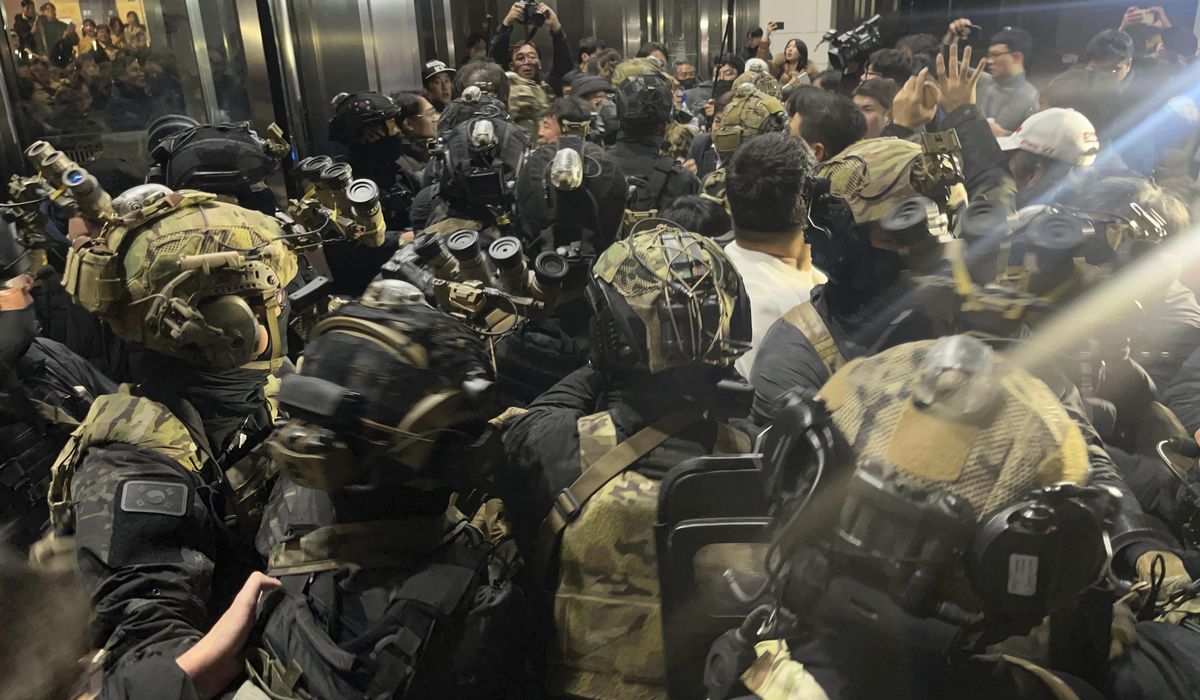


SEOUL, South Korea — South Korean President Yoon Suk Yeol, speaking in an unscheduled late-night TV broadcast Tuesday, announced he was declaring martial law in the democratic nation that is a key U.S. ally in the region.
The conservative president, elected in 2022, cited the threat from North Korea but also slammed the opposition-controlled National Assembly as “a den of criminals” that he said was undermining the constitutional order and paralyzing political, administrative and judicial systems. The Ministry of National Defense in a separate statement Tuesday said it had convened a meeting with key military commanders to bolster the military’s emergency readiness and preparedness.
“The martial law is aimed at eradicating pro-North Korean forces and to protect the constitutional order of freedom,” Mr. Yoon told the nation, promising to “crush the anti-state forces and normalize the country as soon as possible.”
“Dear citizens, I declare emergency martial law to defend the free Republic of Korea from the threats of North Korean communist forces and to eradicate the shameless pro-North Korean anti-state forces that are plundering the freedom and happiness of our people and to protect the free constitutional order,” Mr. Yoon’s address read in part.
What happens next is deeply unclear: South Korea’s parliament, where the opposition Democratic Party now holds a majority, voted unanimously hours later to defy the country’s president and immediately lifted his martial law declaration, Under South Korean law, the legislature has the power to overturn a martial law order, but it was not clear if Mr. Yoon would abide by the vote.
Although he cited the threat from Pyongyang in part to justify his order, Mr. Yoon’s grievances seem to be heavily targeted on domestic political frustrations at home. A decree put out by a newly formed “Martial Law Command,” seen by The Washington Times, reads in part, “All political activities, including those of the National Assembly, local councils, political parties and any political associations, assemblies and demonstrations are prohibited.”
SEE ALSO: South Korean parliament votes to defy president by lifting his declaration of martial law
It goes on to state that media and publications are subject to the Martial Law Command, and all strikes, work slowdowns and gatherings that incite social disorder are prohibited. Violators of the proclamation are subject to arrest, detention and search and seizure without a warrant, the decree warned.
Images have circulated of armored vehicles patrolling downtown streets, and there have also been reports and video showing that the entrances to the National Assembly have been blocked for a time by police. Witnesses later said the security forces appeared to be pulling back from the site.
The Biden administration appeared to be among those blindsided by the announcement, which came while President Biden was in the middle of a tour of Africa. The National Security Council issued a statement Tuesday saying only that “the administration is in contact with the [South Korean] government and is monitoring the situation closely.”
Later in the day, Deputy Secretary of State Kurt Campbell told reporters that Washington was watching the unfolding drama in Seoul “with grave concern.”
“We’re seeking to engage our [South Korean] counterparts at every level both here and in Seoul,” Mr. Campbell said, adding Mr. Biden and Secretary of State Antony Blinken had been briefed on the matter.
“I do want to underscore that our alliance with [South Korea] is ironclad, and we stand by Korea in their time of uncertainty,” he added. “I also want to just underscore that we have every hope and expectation that any political disputes will be resolved peacefully and in accordance with the rule of law.”
KCNA, North Korea’s official news agency, had carried no news reports or statements on the developments in Seoul in the hours after Mr. Yoon issued his declaration.
Mr. Yoon is a former prosecutor and political newcomer who won the 2022 election in a close contest. Operating without a parliamentary majority, he has also faced public ridicule for a range of embarrassing episodes.
He was under parliamentary pressure for his wife’s alleged corruption and for allegedly dubious political appointments.
In recent days, the National Assembly has been the scene of a struggle between Mr. Yoon’s party and the powerful opposition over next year’s budget. The opposition has also submitted impeachment motions against a state auditor and the chief prosecutor.
Opposition leader Lee Jae-myung called Mr. Yoon’s announcement “illegal and unconstitutional.” Even Mr. Yoon’s own party spoke out against his extraordinary action.
“There is no reason to declare martial law. We cannot let the military rule this country,” Mr. Lee said in a video posted online. “President Yoon Seok Yeol has betrayed the people. President Yoon’s illegal declaration of emergency martial law is null and void. From this moment on, Mr. Yoon is no longer the president of South Korea.”
According to the Yonhap News Agency, People Power Party head Han Dong-hoon said Tuesday that Mr. Yoon’s declaration was “wrong” and that he would “block it with the people.”
Speaking after the parliament vote striking down Mr. Yoon’s declaration, National Assembly Chairman Woo Won-sik said the presidential order was “now invalid.”
South Koreans retain clear memories of the military dictatorships they suffered under from 1961 until 1987 — the year the country achieved democratization after years of often bloody protests.
“If [Mr. Yoon] declares martial law he has the force to move the army, and if all the people and students gather and strike, it will be like what [happened in the 1980s],” said one alarmed South Korean citizen who had taken part in demonstrations four decades ago. “It is probably not his decision, probably his wife’s.”
A former conservative president, Park Geun-hye, was impeached and forced out of office in 2017 and jailed after months of massive demonstrations prompted by news that a corrupt personal friend, who held no official position, was influencing Ms. Park’s political decisions.
However, Ms. Park, despite her personal situation, never declared martial law.
• Andrew Salmon can be reached at asalmon@washingtontimes.com.
